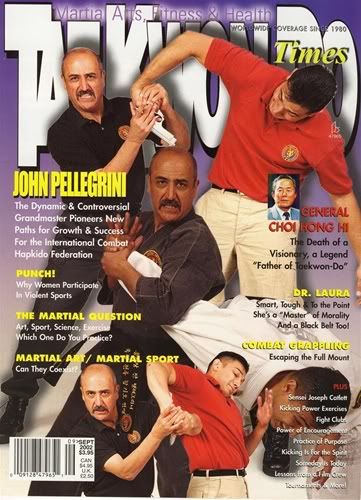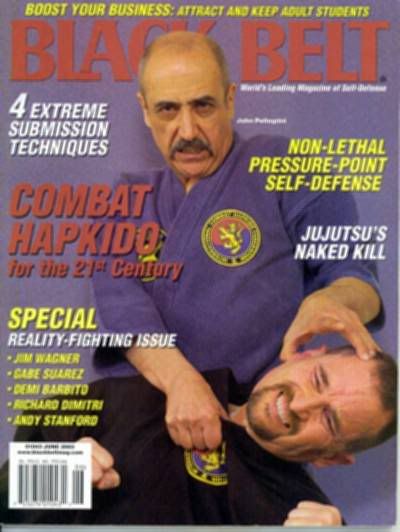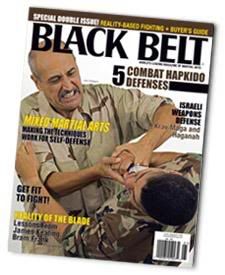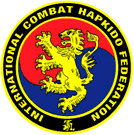This article is by Senior Airman Emerald Ralston 92nd Air Refueling Wing Public Affairs
Posted 4/30/2009
Click Link Here to visit original story site.
4/30/2009 - FAIRCHILD AIR FORCE BASE, Wash. -- To combine, unite or join internal energy and life force within a system or method -- that is a conceptual translation of Hapkido, a system of martial arts that focuses on self-defense, deflection and discipline. Combat Hapkido classes are offered at the base gym by Staff Sgt. Thomas Locke, 66th Training Squadron military training leader and 3rd Dan International Combat Hapkido Federation, Ground Survival Licensed Instructor, Military Combatives Association and IPDTI Licensed Instructor
"Self defense is for everyone," Sergeant Locke said. "The goal is improving yourself and defending yourself. Combat Hapkido is a very balanced, practical martial art that involves situational self defense and getting out of potentially dangerous situations with an aggressor."
The classes go from 6 to 8 p.m. each Tuesday and Thursday, and generally consist of five to 12 people and start with extensive stretches to ensure the utmost safety of the participants.
Following the stretches, students begin the training scheduled for that evening, which changes from class to class.
"Classes are always different," Sergeant Locke said. "I change things up a lot. Sometimes we focus on weapons defense, ground survival, strikes and kicks, escapes, trapping, balance disruption, pressure point activation, etc. I try to keep things fresh and fun. It's never exactly the same, but the core techniques are the spine of the basic requirements."
Some classes included one-on-one practice, and some include an activity where students form a circle and take turns attacking and defending against one another. This practice provides a heightened sense of intensity to help bring up the students' awareness in less predictable environments.
"The idea is to avoid and control," Sergeant Locke said. "Become part of what the aggressor is doing and take control of the situation. It is very important to stay relaxed, and controlling anger is also paramount. Anger makes you tense but when you're relaxed you tend to make better decisions and focus."
Much of the class is intended to help the student become aware of his or her own body. To understand and learn to manipulate an attacker's body because of the understanding gained over one's own self-awareness and coordination, will increase confidence, and once the student sees what his or her body can do, it creates a greater sense of awareness.
"When most people think of martial arts, they think of striking martial arts," Sergeant Locke said. "Combat Hapkido is a scalable and safe way to manipulate someone else's body. It is one thing to do your kicks and punches, but when it's actually applied toward someone who is attacking you, the difference is clear. It is much easier in those situations to avoid and control attacks, rather than rely on strikes alone to defeat a much larger assailant."
Combat Hapkido's concepts are based on scientific principles of anatomy and physiology, as well as psychological strategy. Men and women of all sizes and physical strength are welcome and can do very well in the class because physical strength and athletic ability are not essential. Men, women, children, people with physical handicaps, older adults and military members are welcome, said Sergeant Locke.
Since the emphasis is on redirecting the assailant's aggression and power back toward them, minimum force is required on the part of the practitioner.
The essence of Combat Hapkido is purely self defense. It is the synthesis of dynamic and varied eclectic concepts, scientific principles, realistic application and plain common sense, all formulated into an easy to follow curriculum.
"What often happens is people think that because it's a martial art, it is very strict and they easily mystify the art based on what they've seen in movies and on TV," Sergeant Locke said. "Combat Hapkido is a simple, practical application. There are no mystical components to this practice. When you mystify it, it becomes unapproachable. Hapkido gives you the tools for defense for everyone, in everyday situations."
The class offered by Sergeant Locke through the Force Support Squadron is a licensed charter of the International Combat Hapkido Federation. ICHF is a large organization with more than 300 schools in more than 20 countries.
To get involved, contact Sergeant Locke at 509-868-0188. Classes are held at the fitness center. The first class is free for those interested in getting involved to see if this dynamic and practical self defense system is right for them. Further instruction costs 45 dollars for 16 hours of class time, to be used at the convenience of the student during regularly scheduled training times.












